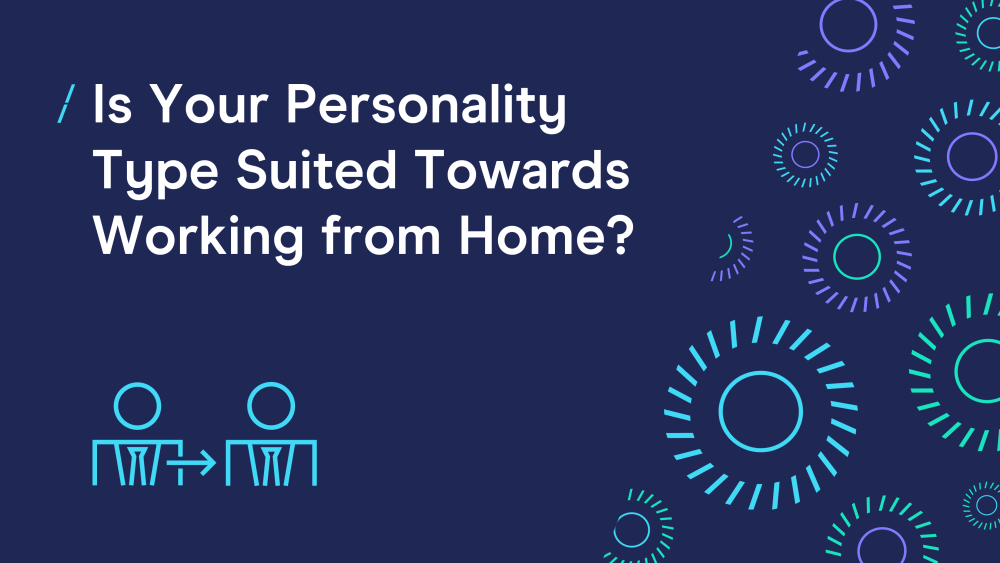Is Your Personality Type Suited Towards Working from Home?
29 Apr 2020

The coronavirus has made working from home the norm, but is it for everyone? In this latest blog supplied by our B2B Council, Bianca Indipendente – Psychosociologist, Innovation, and Organisation Consultant – reveals how the conscientious personality trait affects people’s productivity and coping methods.
In last week’s blog post, we looked at how extraverts and introverts are experiencing social distancing differently. This week, we explore how another pandemic-induced phenomenon is shaping our day-to-day lives – working from home.
Novel as it may seem, many companies have been practising remote working for years. Lots of successful start-ups have been fully remote from the onset (check out Hotjar and Buffer), and many other organisations have been experimenting with ‘flexible’ working, giving their employees more ‘freedom’ to choose when and where they work.
These new ways of working have been quickly gaining traction – in the UK alone, the number of remote workers increased by 25% from 2008 to 2018.
However, in the past couple of weeks, the coronavirus pandemic has triggered a mass remote-working experiment that many employees and businesses weren’t prepared for. This new way of working has affected most industries, including the UK Government, with Prime Minister Boris Johnson chairing Cabinet meetings via Zoom.
With this in mind, this leads us to wonder: how are different people coping with working from home full-time?
Behavioural science has shown us that personality can be critical in determining how we manage stress and perform at work. According to the literature, conscientiousness has been shown to be the most consistent and significant predictor of workplace performance.
Conscientiousness is a measure of how we control, regulate, and direct our impulses. People who score high on the conscientiousness scale, tend to be organised, self-disciplined, and in control of their instincts.
In contrast, people who score low on the conscientiousness scale tend to be impulsive, disorganised, and easy-going. Highly conscientious people are often considered by HR as the perfect candidates for remote work due to their capacity to self-regulate and stick to a schedule.
We used our personality-based marketing platform, Personai, to further explore how the conscientious personality trait affects how people are coping with working from home.
Sampling 500 Twitter users who had recently used the hashtag #WorkingFromHome, we found that 60% of these users had a highly conscientious personality type, whilst only 10% exhibited signs of low conscientiousness; the rest (30%) demonstrated average levels of conscientiousness.
This led us to wonder whether highly conscientious individuals, being the organised and responsible bunch that they are, were using Twitter as a platform to help others. One main commonality that we found amongst this cohort was that their #WorkingFromHome tweets mainly focused on sharing productivity tips and advice: ‘First time working from home? These tips will come in handy’.
On the other hand, we found that those with low levels of conscientiousness mainly tweeted about the challenges and distractions they were facing with having to work from home and their coping mechanisms: ‘Working from home isn't my strong suit, but banana pancakes for breakfast are making it a bit easier!’
However, even though we live in a productivity-obsessed society that favours highly conscientious workers, there are certain work environments where low conscientious workers can thrive.
One recent study found that highly conscientious workers were more likely to leave their organisations when exposed to hindrance stressors at work (such as red tape, role ambiguity, role overload, and office politics).
Low conscientious workers, however, performed better than their counterparts, delivering higher performance ratings when exposed to these hindrance stressors. This gives credit to the capacity of low conscientious individuals (particularly when combined with a high level of openness) to be comfortable with ambiguity and uncertainty in the workplace.
Despite their perceived lack of organisation, in uncertain times such as these, low conscientious individuals would be well placed in helping their company to adapt and pivot their way through a challenging business landscape.
In moments of crisis, companies need to understand, support, and motivate their employees more than ever. Being organised doesn’t come second nature to everyone, but neither does being comfortable with change.
In this particular scenario, we suggest that managers find the time to talk to their employees to discover how they’re coping with work during the pandemic. Companies with a larger workforce may find it difficult to gain a clear and in-depth picture of how their employees are coping due to the sheer scale of their workforce.
Now is a good time to enlist a behavioural science consultancy (such as DPL) to discover the best ways to improve employee satisfaction and motivation.
Don’t be scared to also try out other creative solutions; for example, buddying-up employees on the opposite spectrum of the conscientious scale, so that they can learn from each other to find an equal balance of organisation and acceptance to change.
To find out more about how you can better understand, engage, and motivate your employees and prospects, get in touch here for an initial consultation.
The original article, written by Bianca Indipendente, can be found here.
Other blog posts examining the current situation from a behavioural science perspective include:
- Panic-Buying, Personality Types, and the Coronavirus
- Coping with Isolation: Extraverts vs Introverts
For more information on the coronavirus, check out the DMA’s Coronavirus: The Daily Digest and Coronavirus: Advice and Help. From important Government updates to support for your business and other valuable resources.

Please login to comment.
Comments